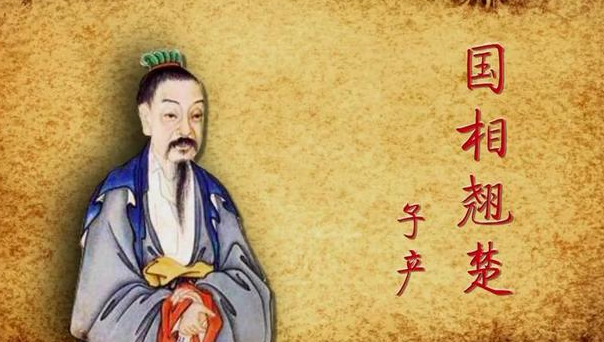During the Spring and Autumn Period, a virtuous man appeared in Zheng Guo, who was the grandson of Zheng Mugong and the son of Gongzi Fa, one of the seven Mu of Zheng Guo, and his name was ZiChan. He was appointed Shangqing in 554 BC and in power in 543 BC, assisting Zheng Jian and Zheng Ding, and died in 522 BC in the fifth year of shenggong. During his reign, Zheng Guo had a stable situation in which the road was not left behind and the house was not closed at night, which to a certain extent reversed the decline of Zheng Guo's decline all the way.

When ZiChan was the secretary of Zheng Guo, his virtue and ability were first seen, and in 548 BC, Zheng Jian sent Zi Zhan and Zi Chan to attack Chen Guo, to put it bluntly, Chen Guo's strength was even weaker, and he wanted to bully it, and this crusade won a victory. The following year, Zheng Jian Gong rewarded the zi exhibition and then rewarded the child property, and prepared to give him 6 cities. Zi Chan refused to say, "My official is ranked fourth, it is not proper to give 6 cities, and this is all the credit of Zi Zhan, I really dare not be ashamed of it", and later Duke Jian insisted on giving Zi Zhi and had to accept 3 cities. It can be seen that the son is a very humble person who is honored by Dong Li, and the prince predicts that the son will be able to govern in the future, because he is humble and not disrespectful.
In 544 BC, the Qimu family met to discuss who would rule the regime. He said, "It is the destiny of heaven for the good to replace the bad, and how can the regime avoid the offspring?" Heaven has been sending misfortune to Zheng Guo for a long time, and the child's inheritance must be able to calm it, and the country can be stable. "At the beginning, there were still many sons who wanted to get rid of their offspring in order to compete for power, but as a result, this time the alliance laid the status of the sub-property, and the sub-property was successfully governed.
During the reign of the son, the following achievements were mainly achieved:
1. Political aspect: uniting and integrating the forces of the Qimuqing clan, single-mindedly seeking development for the interests of the country, and the Seven Mu is the most united period when the son is in power. He also cast a book of punishment in Dingding, thinking that it was the common law of the country, and created the first time in Chinese history to officially promulgate a statute law, before the monarch had any decrees that were not published to the public, and it was enough to open a meeting to some nobles and officials to talk about it, which showed that the descendants were very politically confident.
2. Economic aspect: for the field, for the hill endowment. To re-demarcate the boundaries of the land and prevent the internal strife among the nobility and the antagonism between the nobles and the commoners brought about by the endless expansion of the private land of the nobles. To do the hill is to break the boundary between the country and the wilderness at that time, the people refer to the nobles and some civilians, living in the city and nearby to enjoy the right to be a soldier, because at that time when the soldier was also treated, at least do not worry about eating. Savages refer to remote slaves and civilians, and this reform abolished the distinction between savages and expanded the source of soldiers, which was in line with the trend of war development in the late Spring and Autumn Period.
3. Diplomatically, zhengguo's image and dignity have been safeguarded. Zi Chan visited the Jin Dynasty, cared about the condition of the Duke of Jinping, and talked with the Duke of Ping about history, sacrifices, etc., and the Duke of Jinping and the ministers greatly appreciated the erudition of the Son, showing the image of Zheng Guo. Later, he sent many envoys to the Jin state, the state of Chu, etc. and established good relations with other countries.
<b> </b>In 522 BC, the Sons died, the Zheng people were very sad as the loss of relatives, because the Sons loved the people all their lives, loyalty to the country can be said to be very selfless, even the funeral savings when they died, the Zheng people donated jewelry and jade, the sons of the sons refused to accept, the people had to throw a large amount of donated property into the river of the Children's Estate, mourning this admirable person. The river flooded with golden waves, and since then this river has been called Jinshui River, which is now the Jinshui River in Zhengzhou City, Henan. Confucius and Zichan are the same era of people, Confucius traveled around the world once to Zheng Guo and Zichan like brothers, Confucius heard that Zichan died very sadly called "ancient love". This means that the son is a sage left behind in ancient times.
The sub-production has been greatly admired by the Zheng people, what do we learn from the sub-production?
1. Be humble and courteous. Children do not compete for merit, know humility, and speak politely everywhere.
2. The Grand Duke is selfless. Doing everything is for the sake of Zheng Guo's national interests, without considering his own interests, not even the final funeral money, which shows his degree of incorruptibility and selflessness.
3. Political self-confidence. Uniting the Seven Mus, casting the Book of Punishment in Ding, reforming Tian Hun, and so on, these are the hard bones of reform, and he has gnawed them off one by one, which shows his political self-confidence.